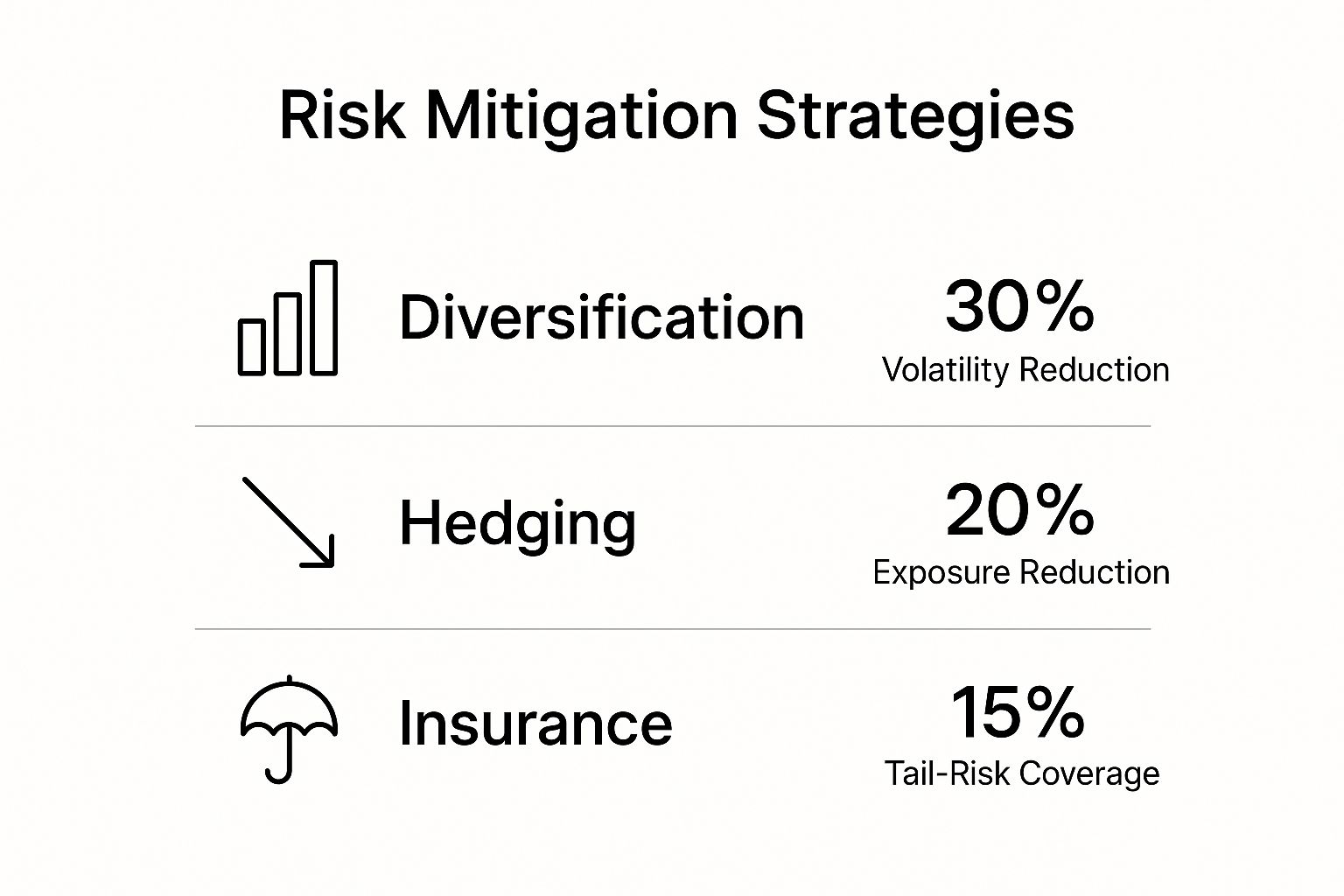Imagine having a dedicated CEO for your family's entire financial world. That’s the real essence of family office wealth management. It’s an integrated, private advisory firm that manages substantial wealth for a single family or a small group of families, offering a complete, 360-degree approach to preserving and growing assets for the generations to come. This guide explores what a family office is, the services it provides, and how this model offers a holistic solution for high-net-worth families.
What Is a Family Office?
A family office is so much more than your typical financial advisor. Think of it as your family's personal headquarters for all things financial, legal, and administrative.
Unlike a traditional wealth manager who might focus solely on your investment portfolio, a family office coordinates everything related to your assets. This structure is specifically designed to handle the intricate challenges that come with significant wealth.
The whole point of family office wealth management is to provide centralized control and strategic oversight. It ensures every decision—from making a new investment to planning a charitable donation—lines up with the family's overarching goals, values, and long-term vision. This model goes far beyond simple asset management to become the ultimate solution for long-term financial stewardship and legacy.
The Shift from Advisor to Integrated Partner
The fundamental difference really comes down to the relationship. A traditional advisor manages your money; a family office manages your family's entire financial life. This deep integration allows for a level of coordination that's just impossible to achieve with separate, siloed professionals.
For example, an investment decision isn't just about potential returns. The family office team will immediately analyze its impact on:
- Tax Efficiency: How does this investment affect the family's overall tax burden?
- Estate Planning: Does it align with the multi-generational wealth transfer strategy?
- Risk Management: How does it diversify the family's total asset exposure?
- Philanthropic Goals: Does the investment align with the family's charitable mission?
This holistic viewpoint prevents costly mistakes and uncovers opportunities that individual advisors, working in isolation, might miss. It transforms wealth management from a series of disconnected transactions into a single, cohesive strategy.

A family office acts as the guardian of both financial capital and family legacy, ensuring that wealth is not just managed, but purposefully directed to support the family's mission for generations to come.
Why This Model Is Gaining Traction
The increasing complexity of global finance, along with a growing desire for greater privacy and control, has made the family office model more and more popular among ultra-high-net-worth families. As wealth grows, so do the challenges of managing it effectively.
Recent reports show that the number of single family offices is projected to grow to over 10,700 by 2030—a clear sign of its rising importance. This structure provides a robust framework to navigate legal, regulatory, and financial hurdles while empowering the next generation to become responsible stewards of the family's legacy.
Exploring Core Family Office Services
Think of a family office as the central command center for a family's entire financial world. It offers a deeply integrated suite of services that all work together in concert. This goes way beyond simple investment advice; it’s about creating a coordinated strategy that lines up every single financial decision with the family's long-term vision and values.
These functions are typically grouped into four core pillars, each one essential to successful family office wealth management.

Comprehensive Investment Management
The first and most recognized function is sophisticated investment management. Unlike traditional wealth advisors who often stick to public markets like stocks and bonds, a family office takes a much broader, more panoramic view. Their mission is to grow the family's capital across generations, which requires a diverse and often unconventional approach.
This typically includes:
- Public Market Investments: Managing portfolios of stocks and fixed-income securities, often with advanced strategies to hedge against risk.
- Private Equity and Venture Capital: Getting access to—and performing deep diligence on—direct investments in private companies or venture funds that are often unavailable to the general public.
- Real Estate: Acquiring, managing, and developing a portfolio of residential, commercial, or industrial properties.
- Alternative Assets: Exploring unique opportunities in areas like commodities, art, collectibles, and other non-traditional assets to provide diversification and a hedge against inflation.
The goal here is to build a resilient, all-weather portfolio that’s perfectly matched to the family's risk tolerance and long-term cash needs. This level of customization is a true hallmark of premier family office services. You can learn more about how we tailor our family office services to fit the unique needs of our clients.
Strategic Wealth and Legacy Planning
Growing wealth is one thing, but a family office is fundamentally concerned with protecting it and ensuring it passes smoothly from one generation to the next. This pillar of service is what truly separates the family office model from standard financial advisory. It’s all about creating a durable framework for the family's future.
Key planning services include:
- Estate and Trust Planning: Designing sophisticated legal structures to minimize tax liabilities and ensure assets are distributed exactly as the family wishes.
- Tax Strategy and Compliance: Proactively managing global tax obligations, from personal and corporate taxes to complex international reporting.
- Succession Planning: Developing a clear plan for transferring leadership and control of family businesses and assets to the next generation, including their education and mentorship.
- Philanthropic Advisory: Helping the family define its charitable mission, establish foundations, and manage its giving for maximum impact.
This kind of strategic planning ensures that the family's financial capital is protected and that its values and legacy endure for years to come.
A family office does more than manage money; it manages complexity. By integrating investment, tax, legal, and personal services, it simplifies the financial lives of its clients and provides them with the clarity needed to make impactful decisions.
Proactive Risk Management
Protecting a family's substantial assets from the unexpected is a critical, around-the-clock responsibility. Family office wealth management involves a proactive, 360-degree approach to identifying and neutralizing potential threats that go far beyond just market volatility.
This means safeguarding against a wide array of personal and financial risks. A comprehensive strategy often covers personal security, cybersecurity to protect sensitive data, and even reputational management. It also involves securing specialized insurance coverage, like Directors & Officers (D&O) liability for family members on boards and robust property and casualty policies. This protective layer ensures the family is shielded from the financial fallout of litigation, accidents, or other crises.
Bespoke Administrative and Lifestyle Services
Finally, a true family office provides a suite of administrative and lifestyle management services that simplify the daily lives of family members. This "family CFO" function handles the intricate, time-consuming tasks that come with significant wealth, freeing the family to focus on their passions and strategic goals.
The table below breaks down the primary functions you can expect from a typical family office.
Key Services Offered by a Family Office

These services handle the immense complexity that comes with substantial assets. To put it in perspective, the UBS Global Family Office Report 2024 found that the average single family office manages a net worth of about $2.6 billion.
These entities collectively oversee over $600 billion globally, a figure that highlights their massive financial footprint and the need for advanced management. Many are now using technologies like AI to fine-tune investment strategies and manage complex portfolios that include everything from private equity to digital assets.
Comparing Different Family Office Models
Choosing the right structure for your family office wealth management is one of the most critical decisions you'll make. Not all family offices are created equal; they operate on different models, each with its own pros, cons, costs, and level of control. Getting a handle on these structures is the first step toward building a framework that actually fits your family's unique needs, goals, and culture.
Think of it like choosing how to travel for a long journey. You could commission a custom-built vehicle designed just for you, join an exclusive car club with shared access to high-end models, or assemble a team of specialists who provide on-demand transport. Each option gets you to your destination, but the experience, cost, and degree of personalization will be worlds apart.
The three main models you'll encounter are the Single-Family Office (SFO), the Multi-Family Office (MFO), and the Virtual Family Office (VFO). Let's break them down.
The Single-Family Office (SFO): The Bespoke Suit
A Single-Family Office is exactly what it sounds like: a private company created to serve the financial and personal needs of just one ultra-high-net-worth family. It's the equivalent of a bespoke, custom-tailored suit—every detail, from the fabric to the stitching, is designed exclusively for you. The SFO offers the ultimate in customization, control, and privacy.
The family directly hires a dedicated team of professionals, which might include a CEO or CIO, investment managers, accountants, and legal experts. This in-house team is completely aligned with the family's interests because they only have one client to answer to. This model allows for an incredible integration of services, from managing a global investment portfolio to coordinating philanthropic activities and educating the next generation.
A Single-Family Office offers the highest degree of control and confidentiality, making it the preferred model for families who demand absolute alignment and discretion in managing their complex financial affairs.
But this level of service doesn't come cheap. The operational expenses of an SFO can easily top $1 million a year, which is why it's typically only a viable option for families with $100 million or more in investable assets.
The Multi-Family Office (MFO): The Concierge Club
A Multi-Family Office, or MFO, provides the full suite of family office services to a select group of affluent families. Think of it as joining a high-end, exclusive concierge club. Members get access to a wide range of premium services and expertise without having to shoulder the entire cost of building and maintaining the infrastructure themselves.
By pooling their resources, multiple families can access a level of talent and institutional-grade investment opportunities that would be tough to get on their own. An MFO offers many of the same core services as an SFO—like investment management, tax planning, and administrative support—but in a shared environment.
This setup delivers significant cost savings and provides a built-in network of peers. The trade-off, however, is a bit less customization and privacy compared to an SFO. While services are high-touch, they aren't entirely bespoke, as the MFO has to serve the needs of its entire client base.
The Virtual Family Office (VFO): The Expert Network
The Virtual Family Office is a more modern, flexible model that has become popular for its efficiency and adaptability. Instead of hiring a big in-house team, a VFO is usually run by a central coordinator or a small core team that manages a network of best-in-class external advisors. This lead advisor acts as the family's quarterback, seamlessly pulling in independent experts in law, tax, investments, and insurance as needed.
This agile approach lets a family tap into top-tier talent from around the globe for specific needs without the hefty overhead of an SFO. The VFO model is highly scalable and can be customized to fit families of varying wealth levels, often starting at around $20 million in assets. The main challenge is making sure all the external providers are perfectly coordinated and working in sync with the family's central strategy.
The image below gives a glimpse into some of the risk mitigation strategies these different office models might use to protect family assets.

As the data shows, a smart mix of diversification, hedging, and insurance can work together to lower portfolio volatility and shield against major financial threats.
The True Benefits Of A Family Office
The real value of a family office goes far beyond just chasing investment returns. While growing your wealth is obviously a central goal, the biggest wins often come from the strategic control, deep privacy, and long-term legacy protection this model provides.
Think of it as the central nervous system for your family's entire financial life. It ensures every moving part—from your business interests to your charitable giving—works in perfect harmony.

This centralized structure is a game-changer for decision-making. It cuts through the noise and potential conflicts that pop up when you're juggling multiple, disconnected advisors. When one team sees the whole picture, strategic alignment just becomes second nature.
Centralized Control And Streamlined Decisions
Picture a family with assets spread across real estate, a private business, public stocks, and a charitable foundation. Without a family office, the head of the family is stuck playing quarterback between a real estate lawyer, a business CPA, an investment advisor, and a foundation manager. It's a safe bet they aren't all talking to each other. That kind of disjointed approach is not just inefficient; it's practically inviting mistakes.
A family office brings all of those functions under one roof. Every decision is then filtered through a single, holistic lens.
A family office transforms wealth management from a series of isolated transactions into a unified, cohesive strategy. This integration is the key to unlocking efficiencies, mitigating risks, and making decisions that serve the family's complete financial picture.
Suddenly, an investment isn't just an investment; it's a piece of a much larger puzzle. The family office team can immediately see how it impacts tax obligations, estate plans, and philanthropic goals, making sure every single move is strategically sound.
Unparalleled Privacy And Discretion
For families in the public eye, privacy isn’t a perk—it’s a necessity. A family office acts as a powerful shield, handling sensitive financial matters with the utmost discretion. Because the staff works directly for the family (in a single-family office) or within a tightly controlled multi-family office, the risk of information getting out is dramatically lower.
This confidential bubble allows families to manage all their affairs, from simple bill payments to complex business deals, far from prying eyes. Achieving this level of privacy is nearly impossible when you’re working with a dozen different external firms, each with its own security protocols and rotating staff.
Access To Exclusive Investment Opportunities
One of the clearest financial advantages of a family office is getting a look at off-market investment opportunities. We’re talking about direct deals, co-investments, and private equity placements that the average investor never even hears about. The combined capital and deep networks of family offices make them very attractive partners for entrepreneurs and fund managers.
This privileged deal flow allows families to:
- Invest Directly: Take direct ownership stakes in private companies, which can offer more control and the potential for higher returns.
- Co-Invest with Peers: Team up with other trusted families to get into larger deals, sharing the due diligence workload and spreading the risk.
- Gain Institutional Access: Get allocations in top-tier private equity and venture capital funds that are typically closed to new money.
These aren't just minor portfolio enhancements; they can fundamentally change performance and provide a level of diversification you just can't get through public markets. It's a major reason why family office wealth management so often delivers superior results over the long run.
A Framework For Legacy And Succession
Maybe the most profound benefit of all is creating a durable framework for family governance and succession. We've all seen how wealth can become a source of conflict between generations. A family office helps formalize the family’s mission and values, creating a structured process for transferring wealth and transitioning leadership.
By coordinating comprehensive financial planning, the office helps educate and prepare the next generation for the responsibilities of stewardship. It opens lines of communication, establishes clear roles, and can even help create a family constitution to guide future decisions. This isn't just about preserving money; it's about preserving the family’s unity and legacy for decades to come.
How To Set Up A Family Office
Setting up a family office is a serious undertaking. It’s the moment you shift your family’s wealth management from a loose collection of advisors into a single, focused entity. Think of it less like flipping a switch and more like designing and building a custom home—it requires a clear blueprint, a solid foundation, and the right team to bring it all together.
That journey doesn’t start with spreadsheets or org charts. It starts with purpose. Before any operational decisions get made, the family needs to sit down and articulate a shared mission. This means having deep, honest conversations about long-term goals, core values, and the kind of legacy you want to build.
Defining Your Family Mission And Vision
This first phase is, without question, the most important one. The goal here is to create a family constitution or mission statement that will act as the North Star for every decision that follows. This document is where you codify the family's values, governance principles, and philanthropic goals.
This process forces you to answer the big questions:
- What is the primary purpose of our wealth?
- How will we make major decisions as a group?
- What roles will family members play in the office's governance?
- How will we prepare the next generation for stewardship?
Getting this clarity upfront is the best way to prevent future conflicts and ensure your family office wealth management strategy is a perfect reflection of who you are as a family. You can learn more about how to structure these critical arrangements in our detailed guide to trust and estate planning.
Building The Operational Framework
Once you have a clear mission, you can start building the operational and legal structure. This is where you get into the nuts and bolts of what the office will do and how it will get it done. A central question is always what to handle in-house versus what to outsource.
For example, a family might decide to build a sophisticated internal team to manage a direct private equity portfolio, but choose to outsource something as specialized as tax compliance to an accounting firm. The goal is to strike the right balance between control, cost-effectiveness, and access to best-in-class expertise.
The structure of a family office should be a direct reflection of the family's unique needs and complexity. There is no one-size-fits-all template; the most successful offices are those meticulously designed around the family's specific financial landscape and long-term objectives.
Developing a realistic operational budget is also crucial during this phase. You need to project costs for everything—salaries, technology, legal counsel, even office space. A well-defined budget ensures the office is financially sustainable and can deliver on its promises without becoming a drain on the family's resources.
Assembling Your A-Team
A family office is only as good as the people running it. Finding top-tier talent who not only have exceptional financial acumen but are also a strong cultural fit can be the toughest part of the whole process. The core team usually includes a Chief Executive Officer (CEO) or Chief Investment Officer (CIO) to act as the primary leader and strategist.
Beyond leadership, you’ll need a network of trusted internal staff and external advisors. This is the engine that will drive your family's financial success and security. Key roles to consider include:
- Investment Analysts: To conduct due diligence and manage the portfolio.
- Accountants and Controllers: To handle financial reporting, bill pay, and budgeting.
- Legal Counsel: To oversee contracts, compliance, and estate planning.
- Administrative Staff: To manage daily operations and lifestyle services.
Conducting thorough due diligence on every potential hire and partner is non-negotiable. This team will be entrusted with your family’s most critical financial and personal matters, so competence and trustworthiness are everything. The scale of these operations can be immense; by 2025, single family offices are projected to manage assets totaling around $4.67 trillion globally. These assets are geographically diverse, with a significant preference for direct investments in asset classes like private equity, showcasing the sophisticated in-house capabilities many offices build. Discover more insights about the global asset pools of single family offices on withintelligence.com. This data highlights the importance of assembling a team capable of managing a complex, global portfolio from day one.
Still Have Questions About Family Offices?
As family offices become a more common way for ultra-high-net-worth families to manage their wealth, it’s natural to have questions. This isn't a small step; it's a significant commitment of resources and careful planning. Getting clear answers before you start is absolutely essential.
Let's cut through the complexity and tackle some of the most common questions we hear. The goal here is to reinforce the core ideas we've discussed and give you some quick, practical insights.
What's The Real Net Worth Needed To Start A Family Office?
There's no single magic number, but here's a reliable rule of thumb: a fully-staffed, dedicated single-family office (SFO) starts making practical sense for families with $100 million to $250 million in investable assets. That threshold is really about justifying the significant operational costs.
Running your own SFO is a serious operation. You can expect annual expenses to range from $1 million to over $5 million. Those costs cover everything from salaries for top-tier professionals to technology, legal compliance, and the office space itself.
If your family's assets are below that level, don't worry. A multi-family office or a virtual family office is a much more cost-effective path. These models give you many of the same core benefits with a far more manageable cost, often requiring a minimum of $20 million to $50 million in assets to get started.
How Is A Family Office Actually Different From A Private Bank?
The biggest difference between a family office and a private bank comes down to two things: the scope of services and—most importantly—the alignment of interests. A private bank is primarily focused on managing your investments and might offer some related financial planning services.
A family office, on the other hand, is a completely integrated, holistic partner. It’s built to manage every aspect of a family’s complex financial life—from legal strategy and tax optimization to philanthropic goals, administrative tasks, and even lifestyle management.
The crucial difference is this: a single-family office is directly employed by the family it serves. This structure ensures 100% alignment and eliminates the potential conflicts of interest that can sometimes arise with product-driven financial institutions that serve many different clients.
What Is Family Governance And Why Does It Matter So Much?
Think of family governance as the playbook that a family uses to organize itself and manage its collective wealth and business interests across generations. It’s the formal framework of rules, roles, and processes that guides decision-making and keeps things running smoothly.
This framework is usually built on a few key documents and structures, like:
- A family constitution that spells out the family's mission, values, and vision.
- An established family council to keep communication flowing and make group decisions.
- Clear policies for family members who might want to work in the family business.
- A detailed plan for succession and how wealth will be transferred to the next generation.
Strong governance is the glue that holds a multi-generational family enterprise together. It helps head off conflicts before they start, prepares the next generation to be responsible stewards of the family’s wealth, and ensures the family's values last just as long as its financial assets. More often than not, good governance is what separates the families that successfully preserve wealth for generations from those that don’t.
Can A Family Office Help With Our Philanthropy?
Absolutely. In fact, philanthropic planning has become a core service for the modern family office. These teams go far beyond just writing checks. They help families professionalize their giving and truly maximize its impact.
A family office can help you define a clear charitable mission that lines up with your family’s values. They bring the expertise needed to set up and run structures like private foundations or donor-advised funds.
They also perform due diligence on non-profits to make sure your donations are being used effectively and can put systems in place to measure the real-world impact of your giving. Increasingly, family offices are also leading the charge in social impact and ESG (Environmental, Social, and Governance) investing. They help families align their investment portfolios with their values, finding opportunities that generate both a strong financial return and a positive social or environmental outcome. This strategic approach turns simple charity into legacy-building philanthropy.
Navigating the complexities of significant wealth requires a partner who understands the complete picture. At Commons Capital, we specialize in providing the sophisticated advisory and management services that high-net-worth families need to protect their legacy and achieve their long-term financial goals. Learn how our tailored approach can bring clarity and strategic direction to your financial world by visiting us at https://www.commonsllc.com.





